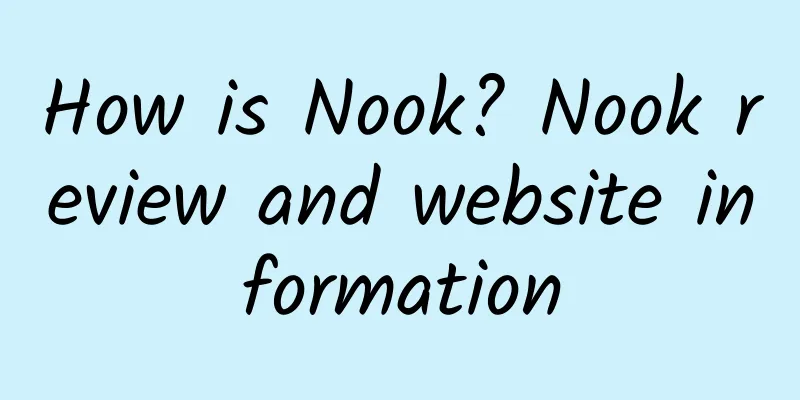Nook: Barnes & Noble's Digital Reading Revolution
In the digital age, traditional paper books are facing unprecedented challenges. At the same time, the emergence of e-book readers provides readers with a brand new reading experience. In this digital reading revolution, Nook is undoubtedly an important participant. As an e-book reader launched by Barnes & Noble, the largest retail bookstore chain in the United States, Nook has quickly occupied an important position in the market since its launch in 2009.
The birth and development of Nook
The birth of Nook marks Barnes & Noble's transformation in the digital age. With the success of Amazon's Kindle in the e-book market, Barnes & Noble realized that it had to launch its own e-book reader to cope with the competition. In 2009, Nook was officially launched, based on the Android operating system and manufactured by Foxconn. Nook not only inherits Barnes & Noble's rich experience in book sales, but also combines advanced technology to provide users with an excellent reading experience.
The design concept of Nook is simplicity, ease of use, and functionality. It is equipped with an electronic ink screen, providing a reading experience similar to that of a paper book, and supports touch operation, allowing users to easily turn pages, adjust font size, etc. In addition, Nook also supports Wi-Fi connection, so users can access the e-book library of Barnes & Noble anytime, anywhere, download and read their favorite books.
Nook vs. Kindle
Before the launch of Nook, Amazon's Kindle had already occupied the vast majority of the e-book market. However, Nook quickly emerged in the market with its unique features and the strong support of Barnes & Noble. In the first quarter of 2011, Nook's sales surpassed Kindle for the first time and became the leader in the e-book reader market.
The success of Nook lies not only in its hardware design, but also in its close integration with Barnes & Noble. Barnes & Noble has a large network of physical bookstores, where users can experience Nook and enjoy face-to-face consultation services with store clerks. In addition, Barnes & Noble has also launched the Nook app, which allows users to read e-books on smartphones, tablets and other devices, further expanding the influence of Nook.
Nook Features and Features
Nook is more than just an e-book reader, it also has many other features that make it a versatile device for users. Here are some of the key features and features of Nook:
- E-ink screen: Nook uses an e-ink screen, which provides a reading experience similar to that of a paper book, reduces eye fatigue, and is suitable for long-term reading.
- Touch operation: Nook supports touch operation. Users can turn pages, adjust font size, highlight text, etc. by touching the screen, making the user experience more intuitive and convenient.
- Wi-Fi connection: Nook supports Wi-Fi connection, allowing users to access Barnes & Noble's e-book library anytime, anywhere, download and read their favorite books.
- Long battery life: Nook's battery life lasts for weeks, so users don't need to charge frequently and enjoy a worry-free reading experience.
- Support multiple formats: Nook supports multiple e-book formats, including EPUB, PDF, etc. Users can easily import and read e-books from different sources.
- Personalized settings: Nook allows users to personalize settings according to their preferences, including fonts, line spacing, background color, etc., providing a more comfortable reading experience.
Nook Applications and Extensions
With the popularity of smartphones and tablets, Barnes & Noble has also launched the Nook app, which further expands the functionality of Nook. Users can download the Nook app on iOS and Android devices to access Barnes & Noble's e-book library and synchronize their reading progress. The Nook app not only provides similar functions to the Nook reader, but also supports multi-device synchronization, allowing users to seamlessly switch between reading on different devices.
In addition, Nook also supports integration with other applications. For example, users can access social media through the Nook application, share their reading experience, or communicate with other readers. Nook also supports integration with cloud storage services, so users can save e-books in the cloud and access them anytime, anywhere.
Nook's Market Impact and Future Prospects
The success of Nook not only changed the business model of Barnes & Noble, but also had a profound impact on the entire e-book market. The emergence of Nook has enabled Barnes & Noble to remain competitive in the digital age, and it has also provided a model for other traditional bookstores to transform digitally.
However, with the popularity of smartphones and tablets, the e-book reader market is facing new challenges. Many users choose to read e-books on multi-functional devices instead of buying dedicated e-book readers. Nevertheless, Nook still occupies a place in the market with its unique reading experience and strong support from Barnes & Noble.
In the future, Nook will continue to innovate in technology and functionality to respond to market changes. Barnes & Noble is also actively exploring new business models, such as launching subscription services and providing more e-book options to meet user needs.
Conclusion
As Barnes & Noble's transformation product in the digital age, Nook not only provides users with an excellent reading experience, but also provides valuable experience for the digital transformation of traditional bookstores. Despite the challenges in the market, Nook still occupies an important position in the e-book reader market. In the future, Nook will continue to lead the trend of digital reading and bring more reading pleasure to readers.
Nook's website is nook.com , where users can learn more about Nook and access Barnes & Noble's e-book library.










